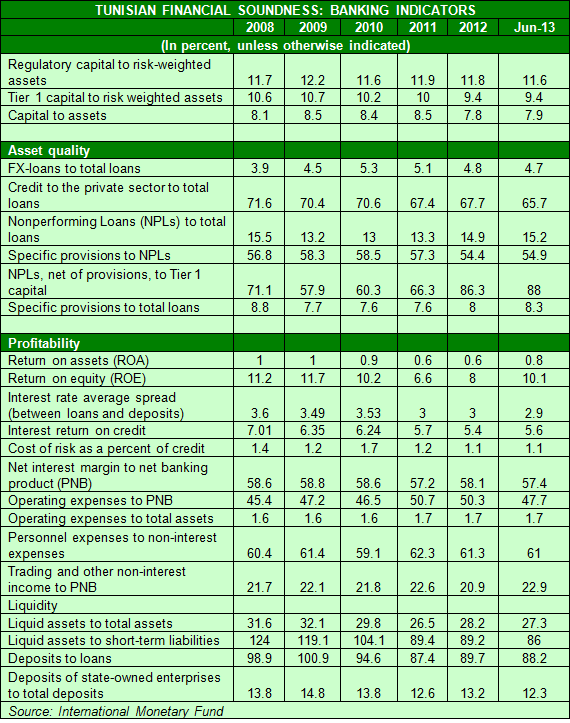Tunisia was Ground Zero of the Arab Spring in late 2010 after a street vendor immolated himself in protest against injustice and inequality. His act of despair sparked a region-wide protest that swept aside the regimes of Tunisia, Egypt and Libya.
At the heart of the corruption that had supported the Tunisian regime was the country's banking sector, and its exposure to companies owned by the former president's family came to light after Zine El Abidine Ben Ali fled.
"State banks are the most vulnerable because they were used as economic policy instruments," the African Development Bank (AfDB) said in a report published earlier this month, noting that non-performing loans stood at 20%, taking into account rescheduled debts.
"Before the Revolution, it [financial services sector] was already plagued by structural vulnerabilities such as undercapitalization, poor asset quality, fragmentation, poor banking supervision or underdeveloped stock markets," the AfDB said.
Tunisia's political transition has not been smooth, as tensions between secular and religious parties raised the country's political temperature. But the approval of a new constitution and the prospect of elections this year have seen funds pouring in from multilateral agencies, boosting the country's financial situation.
The World Bank said recently it would support Tunisia with USD 1.2 billion during its democratic transition. State-owned Qatar National Bank has chipped in with a deposit of USD 500 million, while European banks injected EUR 300 million last year.
In January, the International Monetary Fund released USD 506.7 million to the country under a stand-by arrangement after the approval of the constitution and the appointment of a new government to oversee upcoming elections.
But the institution is keeping a close eye on Tunisia's financial services sector.
"Banking system vulnerabilities should be tackled decisively," the IMF noted. "Recent measures to improve financial reporting, strengthen banking supervision, and reform the governance of public banks are welcome. A strategic vision for public banks, an asset management company, and a new bank resolution framework are key priorities."
RECAPITALISATION & AUDIT
While multilateral support is crucial to the economy in the short term, Tunisia needs to implement a number of reforms, especially restructuring state-owned banks such as Société Tunisienne de Banque, Banque Nationale Agricole and Banque de l'Habitat.
The plethora of small banks could also probably benefit from mergers and consolidation within the sector.
The AfDB notes that a recent assessment of financial system soundness showed that the cost of restructuring the public banking sector could reach 2.6% of GDP over the next two years, or USD 1.1 billion.
"The reforms supported by the IMF include the improvement of banking information, bank recapitalization, the management of non-performing loans (especially those related to tourism), improved management of public banks, better banking supervision and the establishment of a crisis management system."
The Tunisian government has also conducted an audit for two state banks and is expected to complete the audit for the third bank this month.
The government is also looking to create an even playing field for public and private sector banks, and authorities are considering mergers and a reduction of the government's share in the financial services sector through public-private partnerships.
"Bank recapitalization needs for 2014 will be financed through the issuance of non-marketable Treasury bills--with medium-term maturities--with the exception of additional requirements to finance the Asset Management and Recovery Company (AMC)," the governor of the Central Bank of Tunisia (CBT) and minister of finance said in a letter to the IMF.
"The use of these Treasury bills will increase the capital of the banks involved but not their refinancing capacity. These bills could be replaced by marketable securities once a restructuring plan for the banks is introduced."
The Tunisian authorities also plan to set up an asset management company responsible for removing from the banking system non-performing loans in the tourism sector, which represent one-fourth of total non-performing loans.
Apart from improving the reporting standards for banks, the government is looking to issue a draft law to reform the Central Bank (CBT). The proposal will be submitted to the board of directors at the end of the first half of 2014.
"Following recommendations of the CBT's safeguard assessment, the new law (end-June structural benchmark) will cover strengthening the independence of the CBT, improving its governance and methods for conducting external audits, and modernizing the audit and internal control functions."
Pushing through these reforms will not be easy, as Tunisia looks to raise GDP from 2.7% achieved last year to 5% by 2015.
But addressing vulnerabilities in the banking sector will improve confidence, increase credit supply to the private sector, and foster investment spending and employment creation.
While the IMF has lauded the authorities for recent measures to improve financial data reporting, and reforming the governance of public banks, it has warned the authorities to move faster in "articulating a new business strategy for public banks, and urges the authorities to provide the financial resources necessary to recapitalize public banks once the strategy is developed."
"Development and implementation of a new bank resolution framework will further advance structural change in the sector," the IMF said.
Related Links:
http://www.afdb.org/fileadmin/uploads/afdb/Documents/Project-and-Operations/2014-2015_-_Tunisia_Interim_Country_Strategy_Paper.pdf
http://www.bct.gov.tn/bct/siteprod/english/services/resultats.jsp
The feature was produced by alifarabia.com exclusively for zawya.com.
© Zawya 2014




















